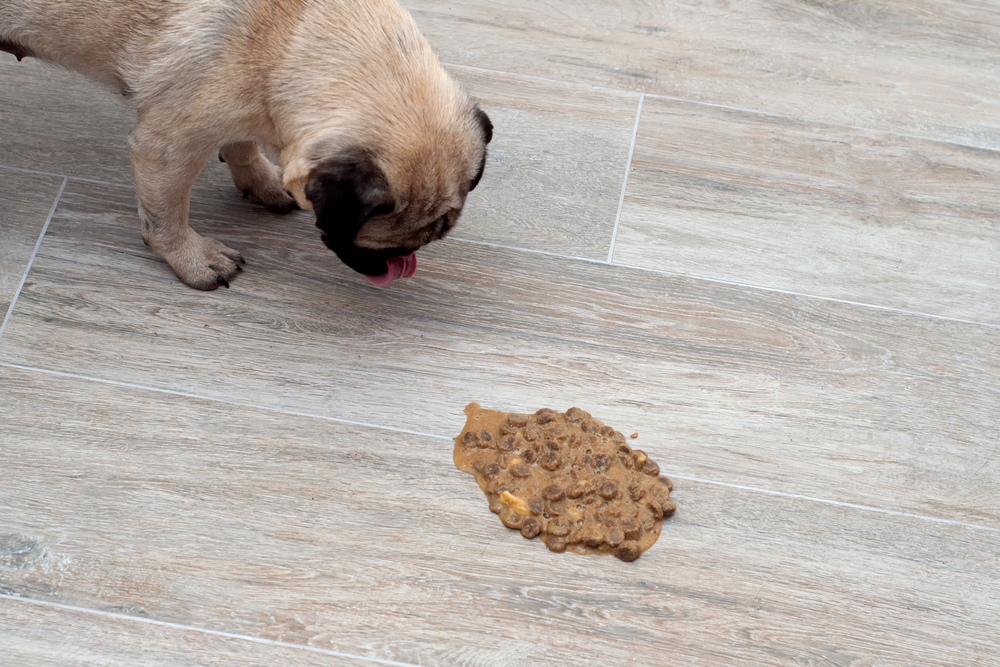Vomiting is common in dogs, but do you understand why they vomit, and when the problem is serious? If your dog vomits only once, is not acting sick, is eating well, and has no chronic health problems, you may have no cause for concern. Vomiting more than once, however, while eating less and acting sick, may indicate a serious problem. If you are not sure, never hesitate to call Animal Care & Emergency Services. Read on to learn about the top six causes of canine vomiting.
#1: Dogs vomit from dietary indiscretion or diet changes
Our first question when a dog vomits often is, “Could they have eaten something unusual in the house or yard?” This is considered dietary indiscretion. For dogs with sensitive stomachs, simply changing dog foods too abruptly can cause vomiting and diarrhea. Most canine gastroenteritis cases can be resolved with medical treatment at our hospital, but a physical examination and diagnostic tests sometimes indicate that surgery is required—for example, if sharp bones have punctured the esophagus or stomach When you call to bring in your vomiting dog, ensure you describe their recent dietary history.
#2: Dogs vomit from organ system disease
Often pet owners suspect vomiting is the primary problem, when actually a larger underlying disease is indicated. Vomiting may be the first thing you notice when your dog has developed liver dysfunction, kidney disease, diabetes mellitus, abdominal cancer, or another common but serious canine disease. When you bring in your vomiting dog, our team will take a detailed history, perform a thorough physical exam, run indicated laboratory tests, and recommend X-ray and ultrasound imaging, if needed. Blood, urine, and fecal tests are usually required to diagnose underlying diseases in vomiting dogs. We will recommend the best diagnostic plan based on your pet’s situation.
#3: Dogs vomit from toxin exposure
The list of toxins that cause vomiting in dogs is long, and includes common household chemicals, foods, and plants. Antifreeze, lye (e.g., drain and oven cleaners), dryer sheets, essential oils, human medications, alcohol, chocolate, holly, and lilies are a few of the potential culprits. If your dog suddenly begins vomiting, and you suspect toxin exposure, check thoroughly for any household items they may have ingested, and bring the suspected items or containers with you to our hospital. A sample or a photograph of the vomit is also helpful. We may recommend that you call a pet poison control center for additional information, as well.
#4: Dogs—especially puppies—vomit from swallowing foreign objects
Puppies, especially very young teething puppies, often try to swallow everything. The problems that ensue range from regurgitating a large rawhide, to blocking the stomach or intestines, to puncturing the intestine altogether. Monitor puppies and dogs closely to determine their tendencies to destroy and ingest toys, blankets, sticks, rocks, caustic batteries, toxic pennies, sewing needles, or other accessible items. If your dog or puppy continues to vomit and cannot hold down food or water, they need our veterinary attention, because foreign body cases often require diagnostic tests, medical treatment, and abdominal surgery.
#5: Dogs vomit from infectious diseases
Infectious diseases can cause vomiting in dogs, and canine parvoviral enteritis, which is commonly known as parvo, tops the list as the most common. Watch for parvo signs in unvaccinated or under-vaccinated puppies or young dogs. The first signs are lethargy and inappetence, followed by vomiting and bloody diarrhea, parvo’s hallmark sign. Always let us know the vaccination status of your vomiting puppy or dog, so we can use contagious disease protective protocols when you arrive. Parvo is highly fatal, with only 50 percent of infected dogs surviving without veterinary care, but hospitalization and intensive care can greatly improve the prognosis.
#6: Dogs vomit from pancreatitis

When dogs ingest large quantities of unusual foods, especially high-fat foods, gastroenteritis can worsen until the pancreas becomes inflamed. If your dog is vomiting, and has a tender abdomen and a suspicious history, we will perform a pancreatitis screening test. Pancreatitis can rapidly worsen and become life-threatening, so dogs often require aggressive treatment, including hospitalization, anti-nausea injections, pain control, and intravenous fluid support. With early detection and proper treatment, most canine pancreatitis cases recover.
#7: Dogs vomit from gastric dilatation and volvulus
One of the deadliest surgical conditions is canine bloat, or gastric dilatation and volvulus (GDV). This occurs when a deep-chested dog’s stomach expands with air and twists on itself, causing an enlarged abdomen, continuous attempts to vomit (i.e., retching) or actual vomiting, and severe pain. If you see these signs you need to seek medical care for your dog immediately.
Determining when your pet needs veterinary help is not always easy, but you can call the caring team at Animal Care & Emergency Services anytime you have questions about your vomiting dog. Starting early is often key for successful treatment of canine vomiting.







Leave A Comment